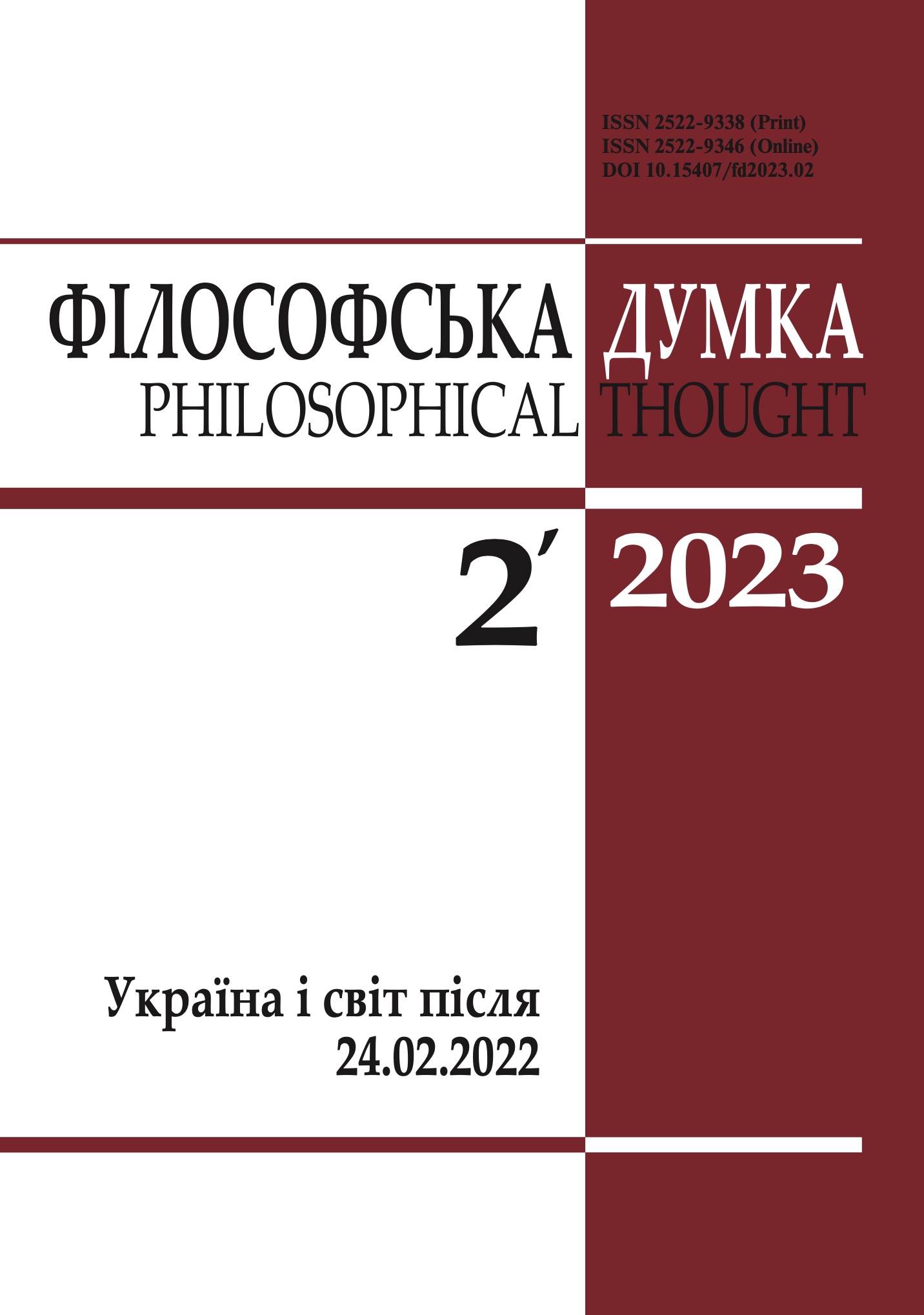CAPABILITIES APPROACH AND THE MARXIST INTERPRETATION OF THE POLITICAL CONCEPTION OF JUSTICE. REFLECTIONS ON THE AFTER-WAR RESTORATION OF UKRAINE
YOUNG SCIENTIST’S PAGE
DOI:
https://doi.org/10.15407/fd2023.02.187Abstract
Marxism as a normative position is critical of liberalism. However, the problems of justice and alienation that Marxism draws attention to can be solved by liberalism without the implementation of a Marxist political project. The purpose of the article is to substantiate the thesis that Martha Nussbaum's capabilities approach (one of the versions of political liberalism) is a more inclusive and rational method of theorizing about the basic principles of justice than Marxism. By analyzing Elizabeth Anderson's theory of liberal egalitarianism "democratic equality", I show that some of Marxist approaches that (1) do not deny the existence of justice and (2) are concerned with the problem of alienation, can apply the arsenal of the moral theory of political liberalism to solve these problems. I also criticize Rawls's and Nussbaum's theories of political liberalism for their procedural vagueness and non-inclusive theory of justice. I present an outline of my position, which I propose to call «extended political liberalism» (hereafter EPL). EPL is currently represented by two arguments: 1) the paideia argument and 2) the argument of the interdependence of the good and the right. The first allows talking about the actual implementation of basic rights and freedoms only when citizens are aware of them and have the opportunity to change their views regarding the personal conception of the good. This is impossible without qualitative basic education. Also, one of the central concepts of EPL is presented within the framework of Paideia's argument - the interpretation of the political conception of justice. Because of this concept, it makes sense to talk about the possibility of citizens' reflection on the reconciliation of the current political conception with the personal conception of the good. This can also be done through the analysis of other conceptions of the good. The second argument is a continuation of the first, appearing as a theoretical mechanism that allows supplementing the existing political conception in case of serious social changes. In conclusion, if we take into account the advantages of the capabilities approach and my criticism of its weaknesses, then a theoretical position will emerge that is quite acceptable to some representatives of Marxism. Moreover, the latter will not have to give up their basic beliefs. The peculiarity of my concept presented in this text is that it is not so much a critique of Marxism as an analysis of the basic normative judgments of political liberalism, with which some Marxists can agree. With this article, I also want to illustrate the strengths of such a concept and point to its prospects for further attempts to interpret the political conception by other normative positions.
References
Anderson, E. (2010). Justifying the capabilities approach to justice. Measuring Justice, 81-100. https://doi.org/10.1017/cbo9780511810916.004
https://doi.org/10.1017/CBO9780511810916.004
Baehr, A. R. (2015). Liberal feminism: Feminist Interpretations of John Rawls, 150-166. https://doi.org/10.5325/j.ctt32b9dp.13
https://doi.org/10.5325/j.ctt32b9dp.13
Callinicos, A., Kouvelakis, S., & Pradella, L. (2022). Routledge Handbook of Marxism and post-marxism. Routledge.
Dworkin, R. (1979). Liberalism. In Public and private morality (pp. 113-143). Essay. Cambridge University Press.
https://doi.org/10.1017/CBO9780511625329.007
Khoma, V. (2022). On the way to expansive political liberalism: Martha Nussbaum's capability approach as a reinterpretation of the ideas of young John Rawls. Filosofska Dumka (Philosophical Thought), (1), 68-83. https://doi.org/10.15407/fd2022.01.068
https://doi.org/10.15407/fd2022.01.068
Kymlicka, W. (2002). Contemporary political philosophy: An introduction. Oxford University Press.
https://doi.org/10.1093/hepl/9780198782742.003.0001
Martinetti, E. C., Osmani, S. R., & Qizilbash, M. (2021). Religion and the Capability Approach. In The Cambridge Handbook of the Capability Approach (pp. 686-705). Essay. Cambridge University Press.
https://doi.org/10.1017/9781316335741.039
Müller, J.-W. (2006). Rawls, Historian: Remarks on Political Liberalism's "Historicism." Revue Internationale de Philosophie, 60(237 (3)), 327-339. Retrieved from: http://www.jstor.org/stable/23955711
Nussbaum, M. (1990). Aristotelian Social Democracy. Liberalism and The Good, 203-252. https://doi.org/10.4324/9780429278433-10
https://doi.org/10.4324/9780429278433-10
Nussbaum, M. C. (2013). Creating capabilities: The Human Development Approach. Belknap Press of Harvard University Press.
https://doi.org/10.2307/j.ctt2jbt31
Nussbaum, M. (2006). Frontiers of justice: Disability, Nationality, Species Membership. Belknap Press.
https://doi.org/10.2307/j.ctv1c7zftw
Nussbaum. (2019). The cosmopolitan tradition: A noble but flawed ideal. The Belknap Press of Harvard University Press.
https://doi.org/10.4159/9780674242975
Owen, J. J. (2001). Religion and the demise of liberal rationalism: The foundational crisis of the separation of Church and State. University of Chicago Press.
Rawls, J. (1999). A Theory of Justice. Belknap Press of Harvard University Press.
https://doi.org/10.4159/9780674042582
Rawls, J. (1951). Outline of a decision procedure for ethics. Philosophical Review, 60(2), 177-197.
https://doi.org/10.2307/2181696
Rawls, J. (2005). Political liberalism. Columbia University Press.
Rawls, J., & Kelly, E. (2003). Justice as fairness: A restatement. WRMS.
Richardson, H. S. (2018). Articulating the moral community: Toward a constructive ethical pragmatism. Oxford University Press.
https://doi.org/10.1093/oso/9780190247744.003.0002
Richardson, H. S. (1995). Beyond good and right: Toward a constructive ethical pragmatism. Philosophy & Public Affairs, 24(2), 108-141. https://doi.org/10.1111/j.1088-4963.1995.tb00025.x
https://doi.org/10.1111/j.1088-4963.1995.tb00025.x
Rudnytsky, I. L., & Rudnytsky, P. L. (1987). Essays in modern Ukrainian history. Canadian Inst. of Ukrainian Studies, Univ. of Alberta.
Seventeenth national survey: Identity. patriotism. values (August 17-18, 2022). Ukraine - Research (s.a.). Retrieved December 8, 2022, from: https://ratinggroup.ua/en/research/ukraine/s_mnadcyate_zagalnonac_onalne_opituvannya_dentichn_st_patr_otizm_c_nnost_17-18_serpnya_2022.html
Downloads
-
PDF
Downloads: 255
Published
How to Cite
Issue
Section
License
Authors who publish with this journal agree to the following terms:
- Authors retain copyright and grant the journal right of first publication.
- Authors are able to enter into separate, additional contractual arrangements for the non-exclusive distribution of the journal's published version of the work (e.g., post it to an institutional repository or publish it in a book), with an acknowledgement of its initial publication in this journal.
- Authors are permitted and encouraged to post their work online (e.g., in institutional repositories or on their website) prior to and during the submission process, as it can lead to productive exchanges, as well as earlier and greater citation of published work (See The Effect of Open Access).


